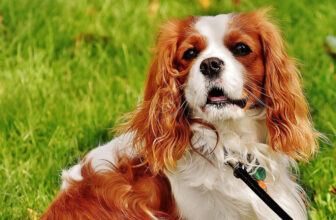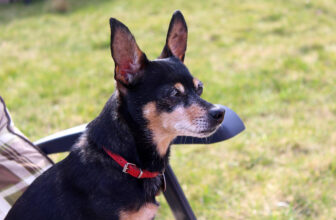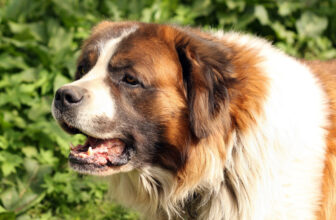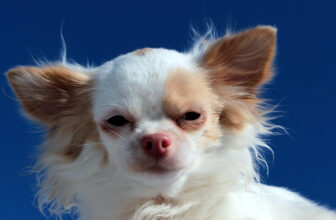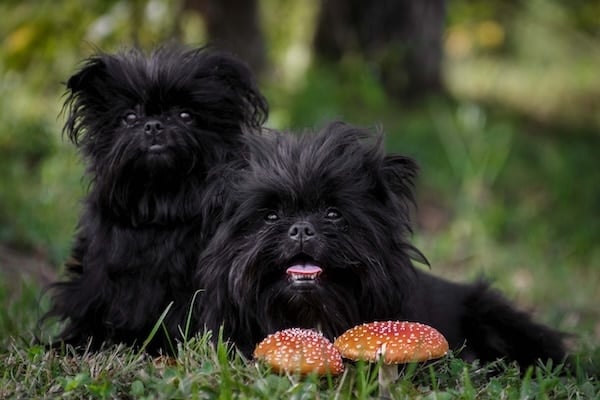
Check out our latest products
- Not a substitute for professional veterinary help.
From the tiny Dachshund to the towering Great Dane, some of today’s most popular dog breeds originated in Germany. Though they vary greatly in size and shape, German dog breeds are confident and athletic—a reflection of their working origins.
German dog breeding during the late 19th and early 20th centuries produced over 50 breeds still known and loved today. This period is when versatile working dog breeds, such as the German Shepherd, were developed, along with a range of herding, hunting, and guarding breeds.
Both then and now, German dog breeds are valued for their keen intelligence, strong work ethic, and loyalty to their human caretakers. If you’re thinking of expanding your furry family, one of the German dog breeds on our list might be the perfect fit.
1. Affenpinscher
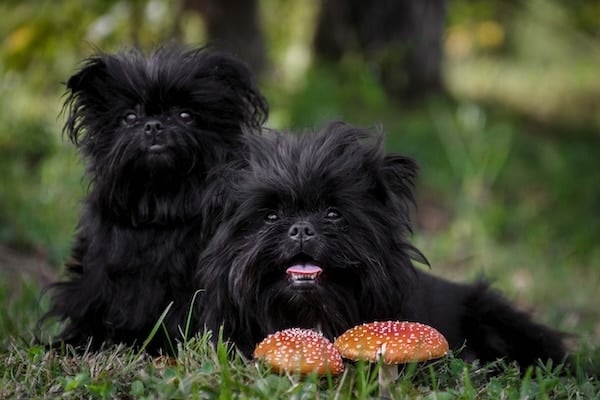
Affenpinscher via iStock
Though this German toy breed may look like it woke up on the wrong side of the bed, the Affenpinscher is very sweet-natured. Affenpinschers have short to medium-length wiry coats, most commonly seen in solid black.
Originally bred to rid German stables of mice, these dogs were eventually brought indoors for pest control in kitchens, leading to their role today as companion dogs. They’re playful, fun-loving, and very loyal little dogs.
Breed Overview:
- Coat type: Short to medium, wiry
- Height: 9-11.5 inches
- Weight: 7-10 pounds
- Colors: Black, black and tan, black and silver, red, beige
- Trainability: Moderately trainable
- Best for: Single pet parents, families with older children, urban dwellers
2. American Eskimo Dog
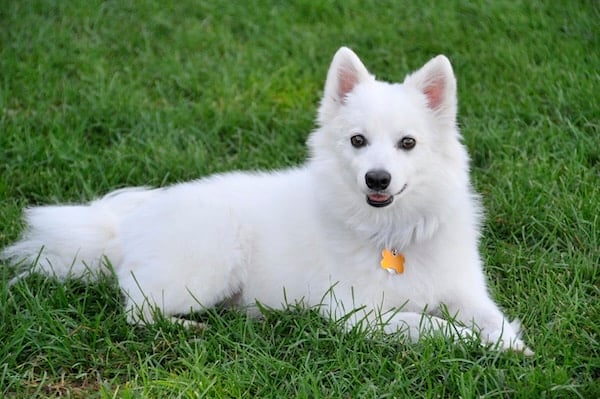

blendshapes via iStock
Fluffier than the Affenpinscher, the American Eskimo dog is easily distinguished by its plush white coat. Though the breed’s name may suggest otherwise, American Eskimo Dogs primarily have German heritage. They were bred from the German Spitz breed, which German immigrants brought to the United States to work on farms.
However, after the US entered World War I, their names were changed due to anti-German sentiment. Available in three sizes—toy, mini, and standard—this breed is best suited to active individuals and families who can handle their working dog energy.
Breed Overview:
- Coat type: Medium-length, double-coated
- Height: 9-12 inches (toy), 12-15 inches (miniature), 15-19 inches (standard)
- Weight: 6-10 pounds (toy), 10-20 pounds (miniature), 25-35 pounds (standard)
- Colors: Always white (sometimes with biscuit markings)
- Trainability: Very trainable
- Best for: Active individuals and families
3. Bavarian Mountain Hound
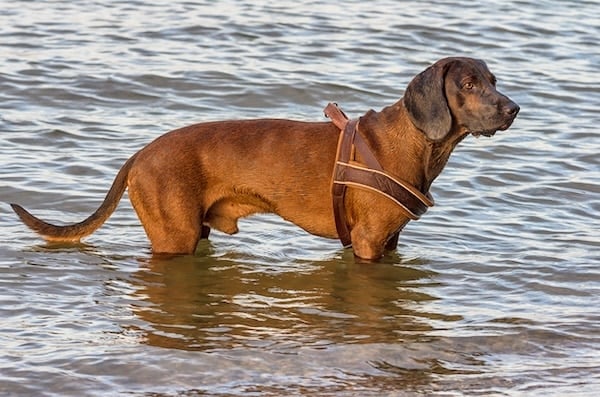

devnenski via iStock
Among the many large German dog breeds, the Bavarian Mountain Hound is known for having exceptional “cold nose” tracking abilities. Developed specifically to track wounded animals, the Bavarian Mountain Hound can follow a game trail that’s long gone cold.
These large, muscular dogs have short, smooth fur and long, floppy ears. Though they’re happiest when hunting, this breed is loyal to family and prefers the company of people to other dogs.
Breed Overview:
- Coat type: Short and smooth
- Height: 17-20.5 inches
- Weight: 37-66 pounds
- Colors: Red, fawn, tan, brown, brindle
- Trainability: Very trainable
- Best for: Hunters, active singles, and families
4. Biewer Terrier
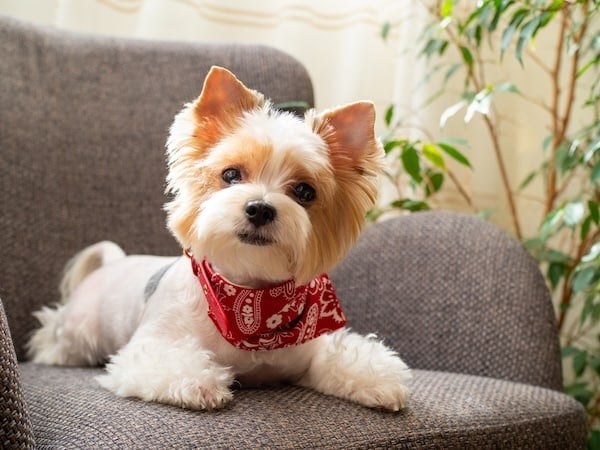

Svetlana Khoruzhaia via iStock
Pronounced “beaver” like the dam-building animal, the Biewer Terrier is a fun-loving, loyal breed. Smart and energetic, these little dogs have a puppy-like enthusiasm that carries over into adulthood. Bred by two German breeders, these charming little dogs were created to be a tricolored version of the Yorkshire Terrier.
They began making their way to the U.S. in the early 2000s and quickly gained popularity. Most recently, the American Kennel Club (AKC) recognized this breed in 2021.
Breed Overview:
- Coat type: Long and silky
- Height: 7-11 inches
- Weight: 4-8 pounds
- Colors: Tricolored (chocolate, tan, white, black, blue)
- Trainability: Moderately trainable
- Best for: Single pet parents, families with older children, urban dwellers
5. Boxer


Kurt Pas via iStock
Where the Biewer Terrier is small and feisty, the Boxer is large and dignified. Initially bred as a German hunting dog from various mastiff breeds, Boxers are born to work. These dogs have strong protective instincts, which makes them popular as guard dogs, but they’re playful at heart and good with children. Plus, their short, smooth coats don’t require more than weekly brushing.
Breed Overview:
- Coat type: Short and smooth
- Height: 23-25 inches (male), 21.5-23.5 inches (female)
- Weight: 65-80 pounds (male), 50-65 pounds (female)
- Colors: Brindle or fawn with white markings
- Trainability: Very trainable
- Best for: Active singles or families with children
6. Dachshund


NORRIE3699 via iStock
Another German hunting breed, Dachshunds were bred to flush badgers out of their burrows. With their short legs and long bodies, Dachshunds are well-suited to the task and have also been used to hunt rabbits and other small prey. Fans of the breed affectionately call them Doxies—a cute name that sometimes clashes with the breed’s tendency toward stubbornness. As such, early socialization and consistent training are crucial for this breed.
Breed Overview:
- Coat type: Smooth and short to medium-length
- Height: 8-9 inches (standard), 5-6 inches (miniature)
- Weight: 16-32 pounds (standard), up to 11 pounds (miniature)
- Colors: Black & tan, chocolate & tan, cream, wheaten, red, black, cream
- Trainability: Very trainable
- Best for: Active singles, families with older children, urban dwellers
7. Doberman Pinscher


iStock/Eudyptula
The Doberman Pinscher was developed in the early 20th century by Karl Friedrich Louis Dobermann, a tax collector in Germany, who sought a dog to accompany him on his payment-collecting rounds. Though sometimes mistakenly labeled an aggressive breed, the Doberman Pinscher is very affectionate with family members. Their sharp intelligence and strong problem-solving ability make them very trainable, but their high need for exercise and mental stimulation may not be a good fit for inexperienced pet parents.
Breed Overview:
- Coat type: Short and smooth
- Height: 26-28 inches (male), 24-26 inches (female)
- Weight: 75-100 pounds (male), 60-90 pounds (female)
- Colors: Usually black with rust markings
- Trainability: Highly trainable
- Best for: Experienced dog owners, active individuals, and families
8. Eurasier
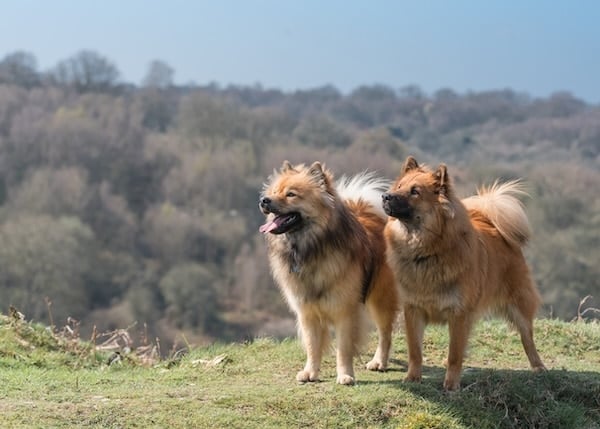

Karen Appleby via iStock
What do you get when you crossbreed a European and an Asian Spitz? The Eurasier! This popular companion dog in Germany is beloved for their fluffy double coats, bear-like resemblance, and even temperaments. Because they were bred specifically for companionship, Eurasiers are very people-oriented. They’re best suited to families or single pet parents who have plenty of time to devote to their pup.
Breed Overview:
- Coat type: Medium-length, double-coated
- Height: 19-24 inches
- Weight: 40-70 pounds
- Colors: Black, red, wolfgray, white, liver, cream, black & tan
- Trainability: Very trainable
- Best for: Single pet parents, families with children
9. German Pinscher


eAlisa via iStock
One of the oldest German dog breeds, the German Pinscher’s exact origins are unknown. They exhibit similar black-and-tan coloring to the larger Doberman Pinscher, though they can also be solid red. Originally kept as carriage dogs, German Pinschers almost disappeared completely after the Second World War. They’re still considered an endangered breed, so finding one may prove challenging.
Breed Overview:
- Coat type: Short and smooth
- Height: 17-20 inches
- Weight: 25-45 pounds
- Colors: Black & tan, red, blue, fawn
- Trainability: Highly trainable
- Best for: Active singles, families with older children
10. German Shepherd


iStock/Eudyptula
Perhaps the most well-known of all the German dog breeds, the German Shepherd was originally bred to be a herding dog. However, over time, they earned dual reputations as a versatile working dog and beloved family companion.
Like the American Eskimo Dog, the German Shepherd had a name change due to anti-German sentiment after World War I. In Britain, they were called “Alsatians,” referring to the region of France that borders Germany. Dog lovers still use this name throughout the UK.
Breed Overview:
- Coat type: Medium to long, double
- Height: 24-26 inches (male), 22-24 inches (female)
- Weight: 65-90 pounds (male), 50-70 pounds (female)
- Colors: Usually red or tan with black markings
- Trainability: Highly trainable
- Best for: Active individuals and families
11. German Shorthaired Pointer
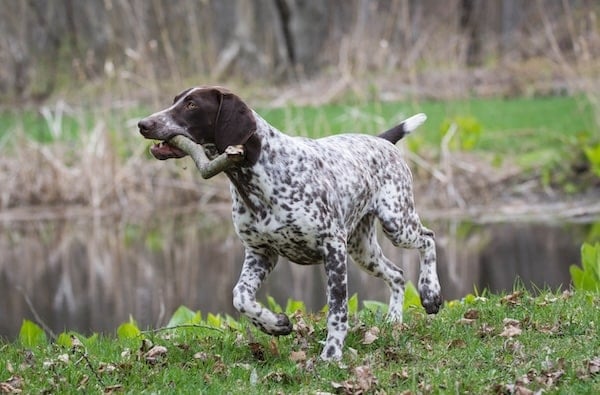

WilleeCole via iStock
The German Shorthaired Pointer descended from early German hunting breeds like the German Bird Dog. As their name suggests, they’re pointing dogs—a type of gun dog trained to find and “point” to game. German Shorthaired Pointers have short, dense coats that range from solid brown or liver to white with flecks or patches of color. This high-energy breed needs plenty of exercise but tends to do well with children and other dogs.
Breed Overview:
- Coat type: Short and smooth
- Height: 23-25 inches (male), 21-23 inches (female)
- Weight: 55-70 pounds (male), 45-60 pounds (female)
- Colors: Solid liver or brown with white or colored flecks and patches
- Trainability: Highly trainable
- Best for: Hunters, active singles, and families
12. German Spaniel
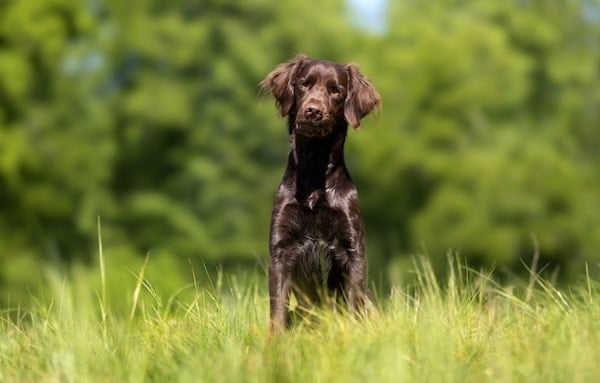

Bigandt_Photography via iStock
Also known as the Deutscher Wachtelhund, the German Spaniel was developed from the Stober, a versatile breed with a long German history dating back to at least 1719. Like the Stober, the German Spaniel has strong scent-tracking abilities, similar to a Bloodhound.
This breed is relatively rare outside of Germany and hasn’t yet been recognized by the American Kennel Club. With their long, wavy coats and floppy ears, they resemble other spaniel breeds like the Springer Spaniel and Cocker Spaniel.
Breed Overview:
- Coat type: Long and wavy or curly
- Height: 19-21 inches (male), 18-20 inches (female)
- Weight: 40-55 pounds
- Colors: Brown or roan with white markings or ticking
- Trainability: Very trainable
- Best for: Hunters, active singles, and families
13. German Spitz
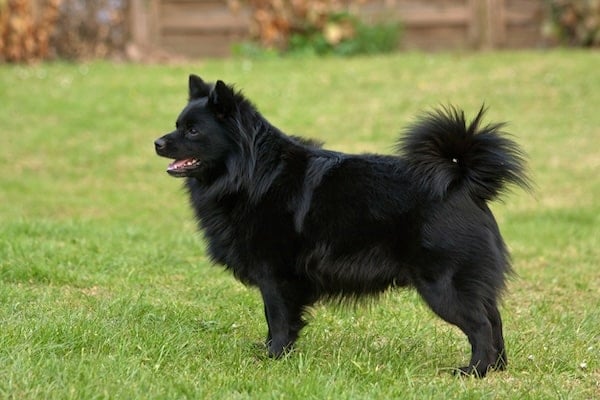

EyeEm Mobile GmbH via iStock
The exact origins of the German Spitz are unknown, but the earliest mentions date back to the 15th century. The modern German Spitz is considered a single breed divided into five variants classified by color and size: the Pomeranian, Miniature Spitz (Kleinspitz), Medium Spitz (Mittelspitz), Giant Spitz (Großspitz), and Keeshond.
German Spitzes are long-haired and double-coated, exhibiting an array of colors including black, tan, brown, cream, orange, red, white, and gray.
Breed Overview:
- Coat type: Long-haired and double-coated
- Height: 8-12 inches (toy), 12-16 inches (medium), 16-20 inches (large)
- Weight: 10-11 pounds (toy), 15-25 pounds (medium), 30-50 pounds (large)
- Colors: Black, tan, brown, cream, orange, red, white, gray
- Trainability: Highly trainable
- Best for: Active singles and families with older children
14. German Wirehaired Pointer
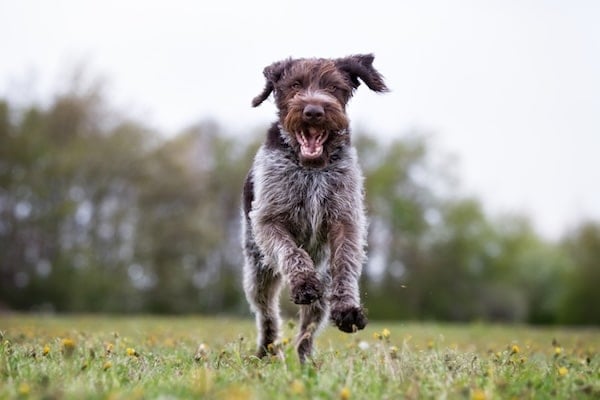

Bigandt_Photography via iStock
This German dog breed may look familiar, given its similarities to the German Shorthaired Pointer. In fact, the German Wirehaired Pointer was developed in the 19th century through crossbreeding German Shorthaired Pointers with other roughhaired and wirehaired hunting breeds.
German Wirehaired Pointers are versatile gun dogs, always eager to work. At home with family, however, they’re gentle and affectionate.
Breed Overview:
- Coat type: Medium-length, wiry, and double-coated
- Height: 24-26 inches (male), over 22 inches (female)
- Weight: 50-70 pounds
- Colors: Liver, white, or black with ticking or patches of solid liver or white
- Trainability: Highly trainable
- Best for: Hunters, active singles, and families with older children
15. Great Dane


Mary Swift via iStock
Though their name suggests they originate from Denmark, Great Danes are also a German breed. Weighing over 100 pounds at maturity, these giant dogs were developed for hunting large game like wild boars. These days, however, they’re more commonly found lounging on the couch.
Great Danes have long legs, big heads, and short, smooth coats. They come in an array of striking colors, but what stands out most about these dogs is their friendly demeanor.
Breed Overview:
- Coat type: Short and smooth
- Height: 30-32 inches (male), 28-30 inches (female)
- Weight: 140-175 pounds (male), 110-140 pounds (female)
- Colors: Blue, brindle, fawn, white, silver
- Trainability: Moderately trainable
- Best for: Individuals and families with older children
16. Hovawart
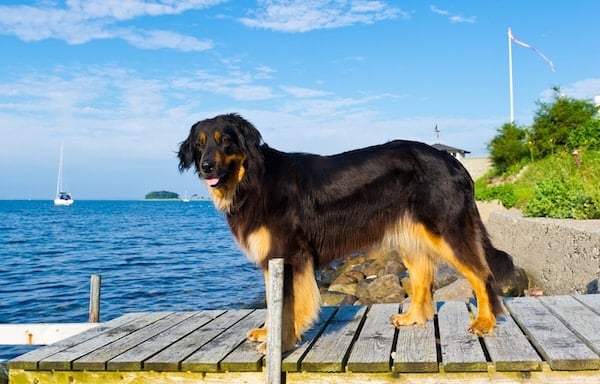

CUHRIG via iStock
Bred to guard livestock, this large German dog breed has a heavy build and even temperament. The Hovawart is happiest when given a job to do, making them a good fit for rescue work, service dog training, and dog sports.
Affectionately known as the Hovie for short, Hovawarts take about two years to mature. Early socialization and ongoing training are essential for this breed, so they may be best suited to experienced dog owners.
Breed Overview:
- Coat type: Medium-length, double-coated
- Height: 23-28 inches
- Weight: 65-90 pounds
- Colors: Black, black and gold, blonde
- Trainability: Very trainable
- Best for: Experienced dog owners, single pet parents, families with children
17. Jagdterrier
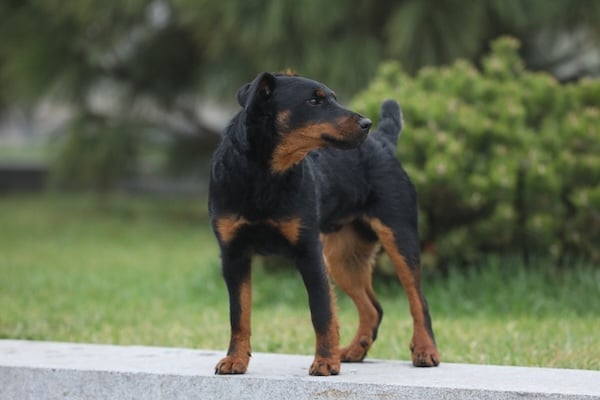

Olha Haletska via iStock
Though the breed’s name may be tricky to pronounce, the Jagdterrier is well worth getting to know. These courageous, hardworking dogs were developed to hunt quarry both above ground and below. Jagdterriers are intelligent and trainable, but potential adopters should be mindful of their high prey drive and consistent need for mental stimulation.
They’re best suited to active singles or families and are likely to enjoy dog sports like agility, flyball, and lure coursing.
Breed Overview:
- Coat type: Short and smooth, rough, or wiry
- Height: 13-16 inches
- Weight: 17-22 pounds
- Colors: Black, black & gray, dark brown
- Trainability: Moderately trainable
- Best for: Active singles and families with older children
18. Kromfohrländer
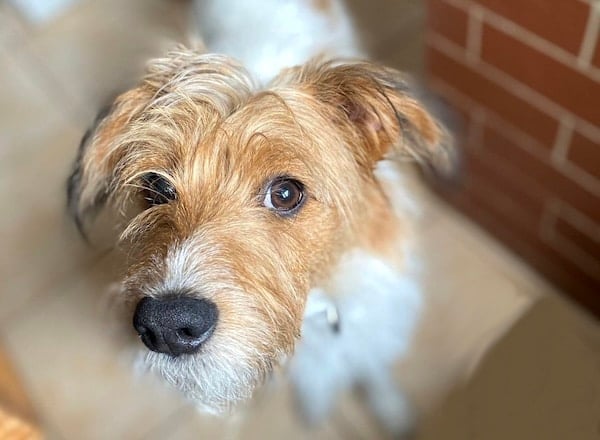

ezp via iStock
Another German dog breed with a unique name, the Kromfohrländer is a companion breed. These medium-sized dogs are smart, loyal, and good with children. They have white, smooth, or wiry coats covered in either brown or tan markings. Despite being developed from terriers, the Kromfohrländer has little in the way of hunting instincts. This breed prefers to play, having a great talent for dog sports like agility and trick training.
Breed Overview:
- Coat type: Short and smooth or wiry
- Height: 15-18 inches
- Weight: 20-25 pounds
- Colors: White & brown, white & tan
- Trainability: Very trainable
- Best for: Active pet parents, families with children
19. Leonberger


lolostock via iStock
With their floppy ears and fluffy coats, Leonbergers look like giant teddy bears, a fitting resemblance since the breed’s primary role was to be a companion. In the 19th century, Heinrich Essig developed these gentle giants specifically for royalty, finding homes with nobility like the Prince of Wales (later King Edward VII) and Napoleon III.
Other Leonbergers, however, found their place as working dogs on farms and docks and were known for being especially skilled at pulling carts. These days, this breed makes a good watchdog and tends to do well in families with children.
Breed Overview:
- Coat type: Long and double-coated
- Height: 28-31.5 inches (male), 25.5-29.5 inches (female)
- Weight: 110-170 pounds (male), 90-140 pounds (female)
- Colors: Sandy, yellow, red, reddish brown
- Trainability: Highly trainable
- Best for: Single pet parents, families with children
20. Miniature Pinscher
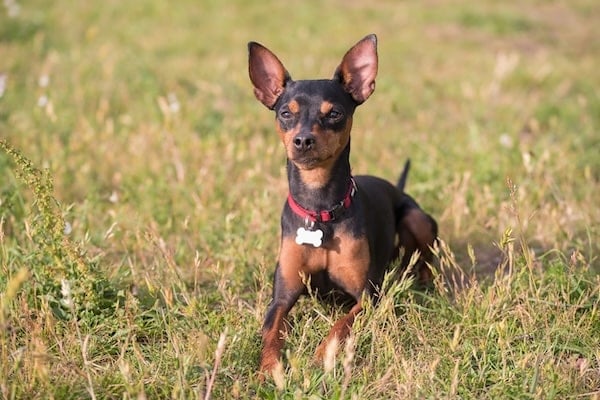

sssss1gmel via iStock
Standing in stark contrast to the impressive Leonberger, the Miniature Pinscher is a toy breed dog of German origin. Affectionately nicknamed the Min Pin, this breed’s ancestry includes the Dachshund and Italian Greyhound.
Sturdy and fearless despite their small size, the Min Pin was initially bred to hunt vermin and often displays an independent streak that’s best managed with consistent training from an experienced dog parent. Still, these dogs are wildly popular in the U.S. and remain at the top of the list of Europe’s favorite dogs.
Breed Overview:
- Coat type: Short and smooth
- Height: 10-12.5 inches
- Weight: 8-10 pounds
- Colors: Red, black & rust, black & tan, chocolate & tan, chocolate & rust
- Trainability: Moderately trainable
- Best for: Experienced dog owners, active singles, and families with older children
21. Münsterländer


Eileen Groome via iStock
The Münsterländer breed is a German gun dog that comes in two sizes: small and large. Both have a vast array of hunting capabilities, including searching, pointing, tracking, and retrieving waterfowl and game.
Bred to be a reliable hunting partner in the field, these dogs also make for an affectionate, eager-to-please family companion. While Münsterländers do well with children, they thrive with active families who can meet their high exercise requirements.
Breed Overview:
- Coat type: Medium-length, double-coated
- Height: 20.5-21 inches (small), 23-26.5 inches (large)
- Weight: 40-60 pounds (small), 50-70 pounds (large)
- Colors: Black & white or brown & white, often with areas of ticking or roan
- Trainability: Highly trainable
- Best for: Active singles and families, hunting
22. Pomeranian
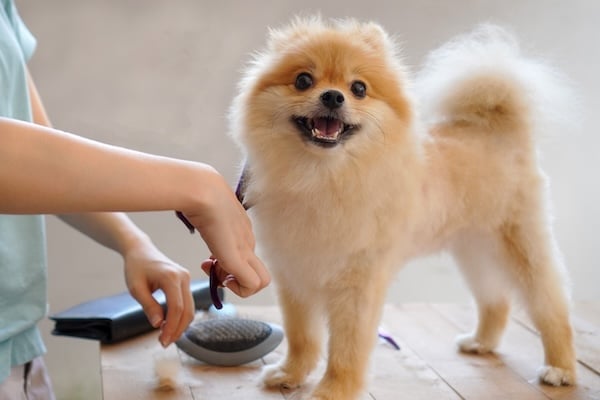

Aonip via iStock
With their fluffy fur and perky personalities, Pomeranians are smaller descendants of the bigger, burlier Spitz sled dogs of the Arctic. Their name derives from Pomerania, a northeastern region of Europe that’s now Poland and Western Germany. Bred for companionship, Pomeranians still retain the spunky spirit and grit of their larger cousins, making them an entertaining and lively addition to households.
Breed Overview:
- Coat type: Long and double-coated
- Height: 6-7 inches
- Weight: 3-7 pounds
- Colors: Widely varied
- Trainability: Moderately trainable
- Best for: Single pet parents, families with older children, urban dwellers
23. Poodle


herreid via iStock
Contrary to common belief, the Poodle did not originate in France, but rather in Germany, as a breed for retrieving waterfowl. In fact, the Poodle’s name derives from the German word “pudelin,” meaning “to splash in water,” so it’s no surprise these dogs are excellent swimmers!
Their curly, waterproof coats not only protect them from the elements, but they also rarely shed, making Poodles a popular pick among allergy sufferers. Easy to train and highly intelligent, they’re excellent family dogs, but do require plenty of mental and physical enrichment.
Breed Overview:
- Coat type: Long and curly
- Height: Up to 10 inches (toy), 10-15 inches (miniature), over 15 inches (standard)
- Weight: 4-6 pounds (toy), 10-15 pounds (miniature), 40-70 pounds (standard)
- Colors: White, gray, brown, cream, red, silver, apricot
- Trainability: Highly trainable
- Best for: Active individuals and families, people with allergies
24. Rottweiler


amriphoto via iStock
Don’t let this big breed’s imposing stature fool you! Rottweilers are friendly and dependable, with a long history of working in Germany. Getting their name from the town of Rottweil, where they first became useful, this breed’s tasks have included driving cattle, pulling carts, and guarding property.
These days, Rottweilers continue to excel in various working roles, including as police dogs, search-and-rescue dogs, and service dogs. They also make loyal family pets, especially with early socialization and proper training.
Breed Overview:
- Coat type: Short and smooth
- Height: 24-27 inches (male), 22-25 inches (female)
- Weight: 95-135 pounds (male), 80-100 pounds (female)
- Colors: Black only with rust, mahogany, or tan markings
- Trainability: Highly trainable
- Best for: Experienced dog owners, families with older children
25. Schnauzer


DevidDO via iStock
One of the quintessential German dog breeds, the Schnauzer comes in three sizes: miniature, standard, and giant. Known for their wiry coats and whiskered snouts, early Schnauzers were originally referred to as Wirehaired Pinschers. All three modern variants are working breeds, ranging from rat catchers to guard dogs, depending on their size.
Smart and obedient, Schnauzers make affectionate family pets that require only moderate exercise.
Breed Overview:
- Coat type: Wiry, medium-length, and double-coated
- Height: 12-14 inches (miniature), 17.5-19.5 inches (standard), 23.5-27.5 inches (giant)
- Weight: 11-20 pounds (miniature), 30-50 pounds (standard), 55-95 pounds (giant)
- Colors: Black, salt and pepper, black & tan, fawn, wheaten
- Trainability: Very trainable
- Best for: Active singles and families with older children
26. Weimaraner


iStock/Bigandt_Photography
The Weimaraner is easily recognizable by its sleek silver coat and long, velvety ears, but the exact origins of this friendly breed are a matter of debate. For a short period, Weimaraners were registered as a blue variant of the German Shorthaired Pointer. By the end of the 19th century, however, they gained recognition as a distinct breed. In Germany, Weimaraners are primarily hunting dogs, but elsewhere, they are equally valued as family companions.
Breed Overview:
- Coat type: Short and smooth
- Height: 25-27 inches (male), 23-25 inches (female)
- Weight: 70-90 pounds (male), 55-75 pounds (female)
- Colors: Blue, gray, silver gray
- Trainability: Highly trainable
- Best for: Active singles and families, hunters
27. Westphalian Dachsbracke
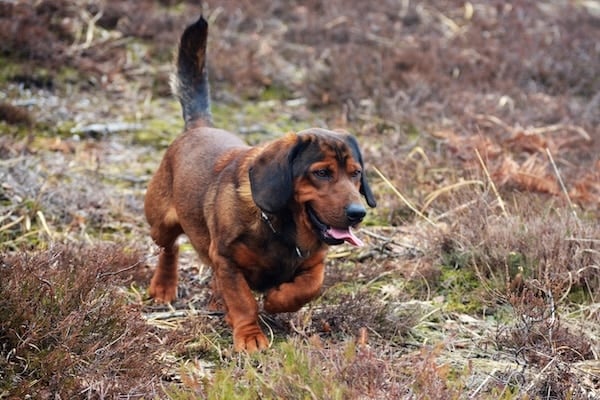

Mladen photography via iStock
Developed in the Westphalia region of Germany, this short-legged hunting breed has droopy ears and a long tail. The name Dachsbracke translates directly to “badger hound,” but also sheds light on the breed’s history. Established by crossbreeding larger Deutsche Bracke with Dachshunds, the Westphalian Dachsbracke is a talented scent hound.
Though relatively rare even in Germany, breeders used the Westphalian Dachsbracke to develop one of the most popular Swedish dogs, the Drever.
Breed Overview:
- Coat type: Short and smooth
- Height: 12-15 inches
- Weight: 30-35 pounds
- Colors: Usually red or yellow with a black saddle and white Bracken marks
- Trainability: Very trainable
- Best for: Hunting, active singles







![[5G & 2.4G] 2K Indoor Security Camera for Home Security, AI Voice Change for 2-Way Talk, Motion Detection, Night Vision, 24/7 SD Recording/Cloud Storage, WiFi Home Camera, Pet Cam with Phone App](https://i3.wp.com/m.media-amazon.com/images/I/61I2U+sTT3L._AC_SL1500_.jpg?w=300&resize=300,300&ssl=1)



